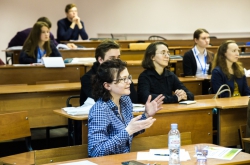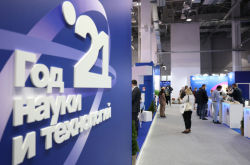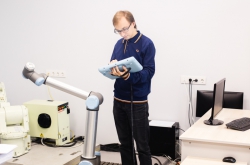The general session of the Congress was opened by ITMO's Rector Vladimir Vasilyev. The professor told of the essential changes that now define the main trends in the development of Russia's science.
"The VI Congress is quite the milestone, as two significant events happened in the end of 2016 and continued on to 2017. First of all, on December, 1st, the President defined the strategy of our country's scientific and technical development. That is most important, as this strategy defines the long-term goals and challenges of scientific community and science-driven business, before developers and researchers. If you read this strategy, you will see that it is radically different from the previous similar documents. First of all, the new term "big challenges" was introduced. It has to do with the challenges that the whole world, not just our country only, faces today. The tasks that are to be solved by both scientists and economy were defined most precisely. What are the main actors of these processes to do about these problems, who will be involved in solving them - physicists, chemists, biologists - is of no real importance; what is important are the results we need to achieve," explained Vladimir Vasilyev.
According to the Rector, solving these problems implies an interdisciplinary approach and involvement of scientists from different fields. As of now, they are to work on not just separate fundamental research, but whole innovation cycles - from research to creating a particular high-technology product or service.
 Vladimir Vailyev
Vladimir Vailyev
"I believe that our scientists, especially our young scientists, are apt for solving the tasks set by this strategy. The challenges and tasks we face are the tasks of the coming decade, and it will be you who will be solving them. In my opinion, one can only successfully train scientists by solving global tasks, and now we got them. We know the general trends and fields we have to work in. It's up to you now," the Rector told the participants.
The young researchers also shared their opinions on modern science, what fields they aspire to work in and why going abroad to continue one's scientific career is no longer relevant.
Vladislav Barselo, St. Petersburg's College of Information Technology
I want to follow the IT field; presently, I work in software development. As for what I think of science, there's something that always attracted me: I believe that in the scientific community, there are no competitors, only those whom you can call your allies. There is noone to fight against, as science is something done for humanity as a whole.
 Vladislav Barselo
Vladislav Barselo
Science offers lots of opportunities. Do I experience any difficulties doing science in our country? No, no one stalls me or such. As of now, I am working on a parental control system that will be totally free of charge. It will provide basic parental control functions for tracking children's internet activity, and also notify parents by SMS. Recently, I took part in the "Youth and Technology" project contest. There, I met people from the St. Petersburg’s Palace of Students who got interested in my idea and offered help: they gave advice on searching for investments and associates. So, I only get support from others.
Of course, there is a trend on going abroad, yet I believe that one has to develop science in the country he was born in. Also, most discoveries and high-technology products can be used by all people throughout the world. For instance, my project has a social focus, it is totally free, so just anyone will be able to use it. As for me, I am comfortable working here.
Kirill Nujdin, ITMO University
My colleagues and I study different diffraction phenomena, for instance, frictions between different materials and elements. For our research, we use different mechanisms from robotic and mechatronic systems.
 Kirill Nujdin
Kirill Nujdin
Doing science is interesting, as you constantly discover new things. Being in contact with smart people, scientists who can share their unique knowledge is all the more interesting. Gathering highly intelligent people who share competencies, correct each other’s knowledge of the surrounding world, dispute about it - all of that is most important. Surely, there's a lot to be done in Russia in this field, yet if we compare the current situation with what was some five years ago, it is evident that we made great steps forward. The government aims to provide scientists with everything they need, funding included. If we continue moving in the same direction, we are sure to be successful. As for my future, I can't tell whether I'll stay here or go somewhere else. Now I am a PhD student, and during my Master's years I got the experience of studying in another country, and that was interesting.
Anastasia Mikheenkova and Marina Lobanova, Samara State University
We work on a big project on tracing biomarkers in exhaled air. Each of us works on a particular part of the project: one of us prepares gaseous mixtures, the other concentrates them.
 Anastasia Mikheenkova and Marina Lobanova
Anastasia Mikheenkova and Marina Lobanova
Science is great, as you can make something new, show your creativity. Science makes you develop, think; sometimes, you find solutions you would never think of in a different situation. We can only judge about the state of science in Russia from a Bachelor's point of view; as for that, our university gives us great opportunities. Nowadays, we have high-end equipment in Russia, so we doubt that one has to go abroad to become familiar with the newest technologies. Anyways, wherever you study, you have to come back to your home country and do what you can there, as its progress depends on its citizens.
Yulia Garmalyga, ITMO University
I study at the Faculty of Cryogenic Engineering. My report is on air conditioning: I will speak of an algorithm for recuperator design. This has to do with using heat from inside a room for heating the incoming air, something like a heat extractor. I think this topic is promising, so I am going to continue my research. Of course, proper infrastructure for doing science has not yet been developed in every city or university; I study at ITMO, where this infrastructure is one of a high level. Young people who want to dedicate themselves to science have to be very serious about choosing the place where they want to study.
 Yulia Garmalyga
Yulia Garmalyga
In future, I want to communicate with scientists from different countries, as I always liked languages, yet I want to stay in Russia. Also, I plan to do teaching, as well.
Maria Pchelintseva, Saratov State University
I present a project on distance learning technologies. I got interested in this topic some time ago, and then focused on it. I believe this is how it happens when you do science: you get interested in something particular, study it in more detail, and in some time become a part of the scientific community. I believe that in the country's leading universities like Moscow State University, Saint Petersburg State University or ITMO University, young researchers have all the opportunities they need. It's hard to tell about other universities - mostly, that depends on funding. Personally, my field is non-technical, so I don't need many resources. One of the reasons for me participating in the Congress was taking part in the contest for entering a Master's program at ITMO University, so I do not really plan on going to study abroad at the moment. I think I want to stay here and work in my home country.
 Maria Pchelintseva
Maria Pchelintseva
Mikhail Vasenin, Financial University under the government of the Russian Federation
My colleagues and I present a model of optimization and automation of processes in retail. We propose a new approach: we've studied how to replace what a product manager does with mathematical algorithms, and make it more efficient for small and medium businesses. Once I went to a store with my friend who does science, and saw five crates of bananas there. In some days, we saw four of the same crates there; the bananas were rotten. We thought - why does that happen, can't science and modern IT-technologies prevent such simple problems? Thus, we started to calculate. Our project's main goal is to decrease the costs of products and create an instrument that will increase the profits of the producer. These two goals may seem controversial, yet we have particular ideas on how to attain both.
Participating in science conferences is interesting. Personally, I am not a fan of university education, as I believe that it doesn’t exactly give students the knowledge that is relevant.
 Mikhail Vasenin
Mikhail Vasenin
Starting with my second year, I began working for different companies, and I now know the structure of business and economics in Russia from the inside; unfortunately, few enterprises are really ready to introduce innovations and increase their efficiency. I believe that the reason is because the markets in Russia are yet to be congested, so there is no demand for efficient approaches and new research in this field. All what is done are efforts of really talented enthusiasts that are in love with what they're doing.
When speaking about my future, I want to move to St. Petersburg, though I come from Moscow. If I will have an opportunity to find some work here, I would gladly stay. I believe this city is freer, and better for students. I want to become an expert on management accounting automation, and continue to participate in conferences so as to promote new solutions and models to solving different problems. As of now, my colleagues and I already have many ideas in this field. And, surely, I want to work with case studies, as I've been successfully doing that for some time already.





